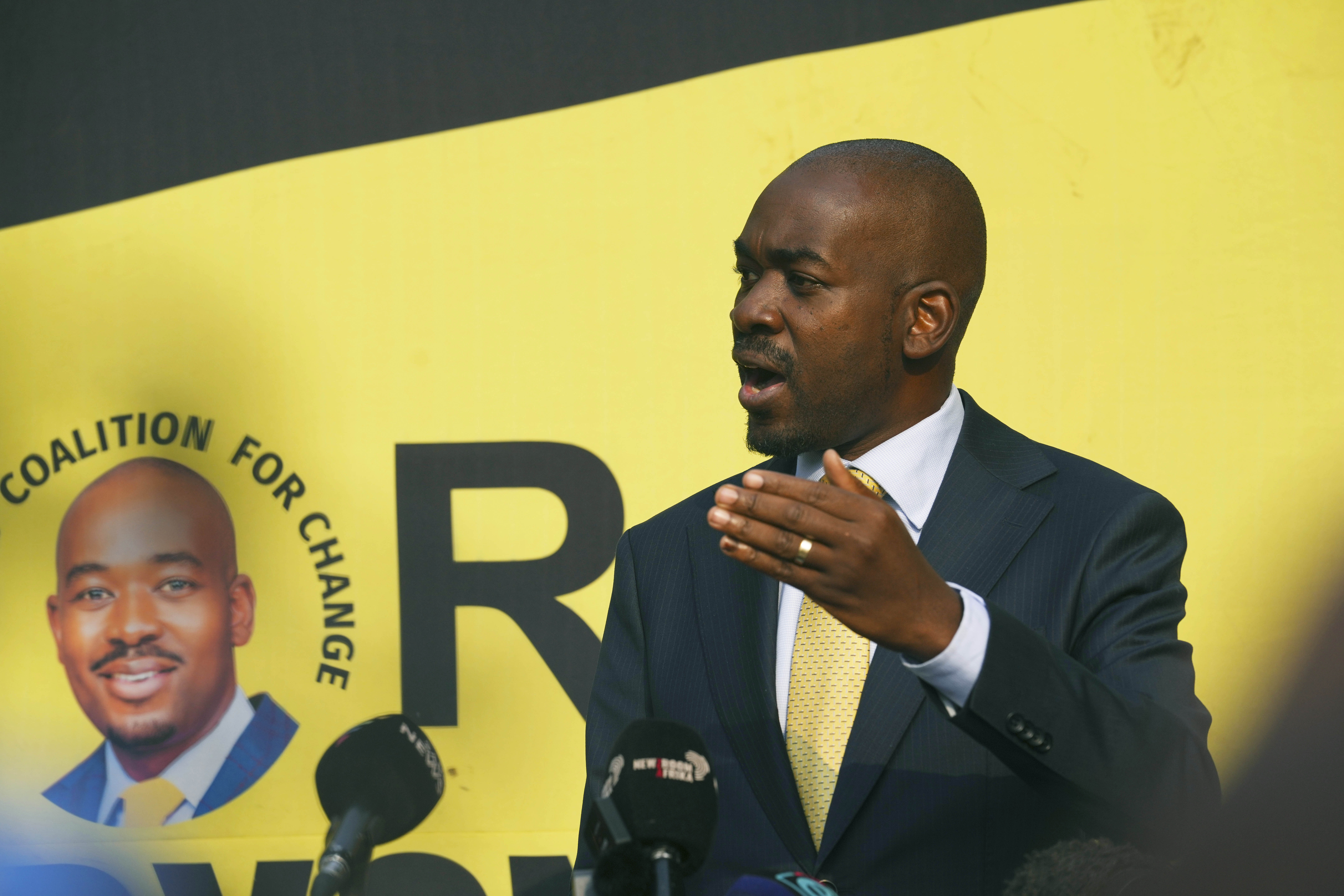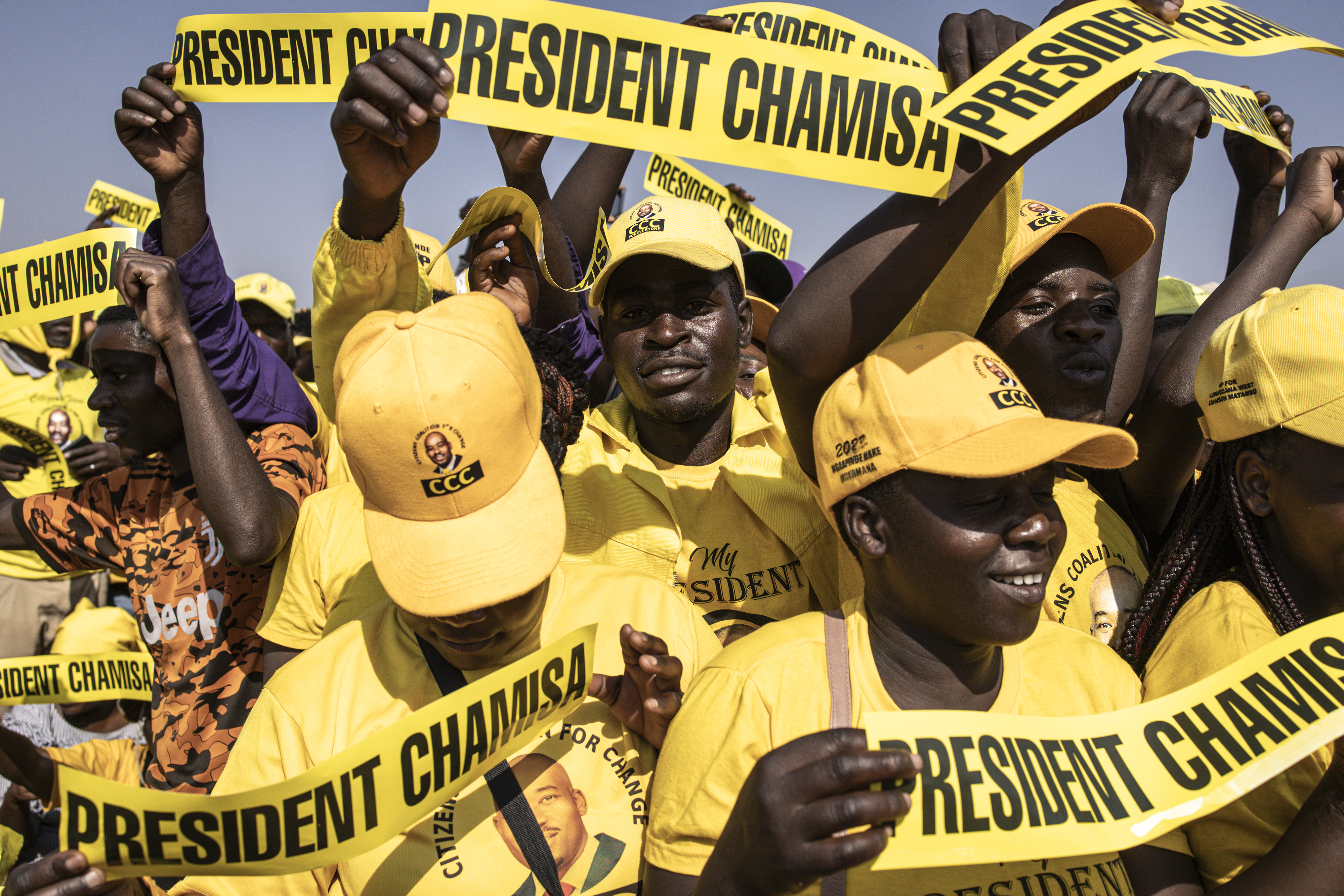
Harare, Zimbabwe – On January 25, exactly two years and three days after Zimbabwe’s main opposition party the Citizens Coalition for Change (CCC) was launched, its leader Nelson Chamisa quit, leaving the party in turmoil.
In a 13-page statement, the 46-year-old lawyer and clergyman listed a litany of reasons why he was taking the extraordinary step of abandoning the party he and others formed in 2022. His main gripe was what he called “infiltration” by the ruling Zimbabwe African National Union-Patriotic Front (ZANU-PF).
The opposition leader, who is expected to form a new party sometime soon, said he would not “swim in a river with hungry crocodiles”, in reference to CCC members he accuses of being sellouts workng for the ruling party.
But Harare-based analyst Alexander Rusero says Chamisa bailed because he had lost control of the party.
“You don’t run away from a movement that you are leading because of infiltration; if you are in control, you purge the infiltrators,” Rusero told Al Jazeera. He added that infiltration is par for the course for political parties, and Chamisa needs to learn to live with it if he wants to continue in politics.
A history of divisions
Divisions and tussles in Zimbabwe’s opposition are nothing new.
In 2018, longtime opposition leader Morgan Tsvangirai, founding president of the Movement for Democratic Change (MDC), died.
Chamisa claims Tsvangirai appointed him as acting leader of the country’s then-largest opposition before passing away. So he proclaimed himself party leader at the late Tsvangirai’s burial, ran under the MDC banner in 2018 for president, and came second to incumbent Mnangagwa.
However, the leadership battle spilled into court, which ruled that Chamisa’s leadership of the MDC was unconstitutional, and Thokozani Khupe, Tsvangirai’s deputy, was the rightful successor. That led to Chamisa forming the CCC in 2022, with some of those who broke away from the MDC joining.
Chamisa losing his grip on the CCC leadership became evident only weeks after last August’s elections, when the party won more than 100 of the 280 seats in the Parliament of Zimbabwe, denying the ruling party a two-thirds majority that could allow it to change the Constitution.
Sengezo Tshabangu, who claimed to be the party’s interim secretary-general, started recalling MPs and councillors, saying they were no longer CCC members. Under Zimbabwe’s constitution, an MP who ceases to be a member of the party under which he or she got elected has to vacate the seat, thus triggering a by-election.
Tshabangu wrote to the speaker of Parliament advising him to recall the MPs. The CCC labelled him an impostor and a proxy of the ruling party, but its request to ignore the recall letter was denied.
The MPs lost their court challenges of the recalls and were barred from contesting the resultant by-elections. Emboldened by the court’s ruling, Tshabangu recalled more MPs and councillors. Again, the courts stopped Chamisa’s faction from running at Tshabangu’s behest. He backed his candidates who all lost to ZANU-PF, which now has the two-thirds majority it yearned for.
Still, Tshabangu claimed to be loyal to Chamisa, referring to him as “president”, as is common practice in the CCC. He said his problem was the selection of candidates for the August poll, and he alleged the party leadership disregarded those chosen by the people during primaries and imposed their preferred candidates instead on ethnic grounds.
Tshabangu is widely believed to be the face of leaders in the CCC unhappy with Chamisa’s one-man leadership style.
The fate of the elected officials is currently a leading topic of national debate. Some people say they should follow their leader out of the CCC, while some argue they should stay in place to represent those who voted for them.
Of the two MPs who have resigned in solidarity with Chamisa, one, Rusty Markham, spoke to Al Jazeera. Markham said most MPs fund election campaigns from their own pockets and may be reluctant to leave Parliament before realising a return on their investment.
Some MPs, however, argue they need to remain to represent the interests of those who elected them.
University of Western Cape’s Brian Raftopoulos, a Zimbabwean professor of democratic governance, feels they are right to do so.
“They should hang on to the seats they have, I don’t think they should walk away from Parliament because giving that space would be donating it to ZANU-PF,” he told Al Jazeera.

A ‘structureless party’
The ruling party has, however, denied involvement in the upheaval within the opposition. “We are only commenting on this because of our name being mentioned falsely by Chamisa. We have our organisation to run and the nation to provide for,” said Farai Marapira, ZANU-PF acting information director.
However, analysts say ZANU-PF may have taken advantage of a situation of Chamisa’s making as his leadership style comes under scrutiny.
His hardcore cheerleaders refuse to fault his moves and will go wherever he goes. But some say the CCC’s problems stem from the lack of organisation within it.
Analysts say that when Chamisa formed the party, he used strategic ambiguity – keeping it as an amorphous entity without clear leadership organisation or a constitution – to avoid infiltration. This led to Chamisa personalising power.
“His gamble of having a structureless party failed,” said Ibbo Mandaza, director of the Harare-based think-tank the Southern African Political Economy Series (SAPES) Trust.
Former cabinet minister Jonathan Moyo, in self-imposed exile in Kenya, has also criticised the CCC in The Herald, a state-controlled daily, saying that “while a structureless and constitutionless formation may work for a cultic church, it can never work for a political party.”
Other critics accuse him of promoting a cult of personality.
But former CCC MP Markham claims the party had a structure, “How do you get thousands of people to attend a rally without structures?” he asked rhetorically. He blamed a compromised Parliament and judiciary for accepting Tshabangu as a CCC official without any paperwork to prove it. “The goal was to destroy the CCC and get ZANU-PF the parliamentary two-thirds majority it failed to get at the polls,” he said.
Markham was cagey about whether Chamisa would form a new party, but observers say this will be the case, as he is not done with politics yet.
In the statement rebuffing the CCC, Chamisa also asked Zimbabweans “to rally behind fresh politics, new politics, and genuine fresh and credible leaders who want to serve and not to be served”.
Chamisa agreed to speak with Al Jazeera, but did not show up for the appointment. He subsequently said he would call to arrange another appointment but failed to do so.
Nobody but Chamisa
However, the nagging issue of Chamisa’s perceived personalisation of the CCC just won’t go away. The day he disowned CCC, a senior party member told Al Jazeera anonymously that he learned about his leader walking away from the party on social media, “just like everyone else”.
Critics are also concerned about Chamisa’s frequent invocation of God. He has used the catchphrase ‘Godsinit’ for years and regularly posts Bible verses on X, formerly known as Twitter. He recently told the Voice of America that he took advice from God. “People make the mistake of thinking I do things as an individual,” he said, noting “I have one chief adviser … the Holy Spirit is a powerful adviser”.
That has not gone down well with some who feel politics and religion should be separate.
Regardless, Chamisa is still seen by many as the Pied Piper of opposition politics in Zimbabwe; at 46, he is still young, charismatic, and articulate, but Mandaza feels he stands out merely because of the mediocrity and a limited pool of potential leaders in Zimbabwe.
“Some of the people who could lead have joined the exodus out of the country. There is also the belief that ZANU-PF is too entrenched and intolerant towards newcomers,” he says.
Rusero also weighed in, noting “Chamisa may have the numbers but whatever he does next, he needs to be clear about what his party stands for besides removing ZANU-PF from power. They need to go beyond just mobilising a multitude of people and hoping that change is coming; they need to articulate what their ideology is.”
While Zimbabweans await Chamisa’s next move, his supporters have been holding meetings clad in blue, rumoured to be his next party’s colours, a departure from the CCC’s yellow. Whatever the new party name, they hope they can use its acronym to create a catchy slogan the way CCC became Chamisa Chete Chete, Shona for “Nobody but Chamisa”.







